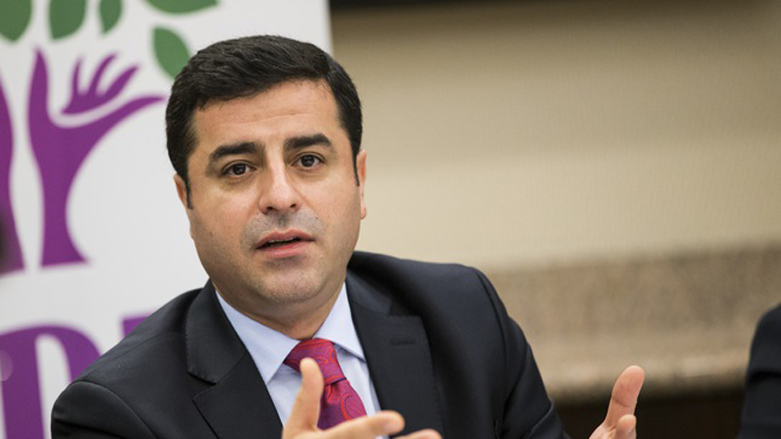Demirtas’ Low-Key US Visit

WASHINGTON, United States (Kurdistan24) - Selahattin Demirtas, co-chairman of Turkey’s People’s Democratic Party (HDP), was the keynote speaker on Friday in a day-long conference at Washington DC’s National Press Club, hosted by the HDP, along with a new Washington think tank, the Kurdish Policy Research Center.
Demirtas last visited the US capital in December last year, when Foreign Policy named the 42-year old lawyer as one of the top 100 “Global Thinkers” of 2015 and touted the charismatic politician as “the Kurdish Obama.”
That was the HDP co-chairman’s first visit to Washington as leader of a Turkish parliamentary party. On Friday, he spoke to a packed room and described his objectives in this visit. They were surprisingly modest.
He said that he sought to share with US officials “our perspectives, recommendations, and solutions” to problems, “instead of their hearing about us through third parties.” As they formulate their policies and positions, “they are at least aware of what we think,” he explained.
The HDP leader affirmed that there was “no problem” meeting US officials, whether in Congress or the administration. However, he was “not sure how effective the meetings will be.” Clearly, he had limited expectations, but the reasons for that were never really explained.
Demirtas placed his US visit in the context of regular travels to countries with influence in Turkey and Syria, including Europe and Russia. He had met with more senior officials in both places than he would in Washington. Visiting Germany in mid-April, he had seen German Chancellor Angela Merkel, as well as Germany’s Foreign Minister. In Moscow, he had met with the Russian Foreign Minister, Sergei Lavrov.
No such meetings were on Demirtas’ Washington schedule. Nonetheless, he described pressing concerns, including Ankara’s brutal military campaign against Turkey’s Kurds, of which he repeatedly spoke: thousands of people killed, with some 500,000 displaced, at least temporarily.
And throughout Turkey, the situation is deteriorating with regard to fundamental democratic norms, including freedom of the press, independence of the judiciary, and respect for human rights.
Still Demirtas refrained from expressing any direct criticism of the Obama administration, which has said relatively little about such abuses. This reticence contrasts with his complaint a month ago in an interview with Kurdistan24 that the US had turned a “blind eye” to Ankara’s warfare against its own Kurds and that the US policy was an “attempt to ride two horses heading in different directions.” The US supports the Syrian Kurdish People’s Protections Units (PYD) militarily, Demirtas said, but denounces the Turkish People’s Workers’ Party (PKK) as a terrorist organization.
Notably, when Turkish President Recep Tayyip Erdogan visited Washington in the context of the Nuclear Security Summit a month ago, he did see President Barack Obama. The meeting occurred despite initial reports that none had been scheduled as a token of Washington’s disapproval of Erdogan’s increasingly dictatorial and abusive posture.
Alan Makovsky, a former staffer with the House Foreign Affairs Committee and now a Senior Fellow at the Center for American Progress, noted that the US is inhibited from criticizing Ankara at present, because it needs Turkey’s Incrilik airbase to fight the Islamic State. But Makovsky also suggested that Washington probably had more leverage over Ankara than it realized, because Turkey was “very isolated.”
Demirtas’ discussion was moderated by Dr. Omer Taspinar, Professor of National Security Strategy at Washington’s National Defense University, where many of America’s top military officers study, as do senior-level civilians involved with national security policy.
Taspinar asked the HDP leader, “What has been the impact of Rojava—the Syrian Kurdish entity—on the conflict in Turkey?”
He responded that it “directly impacts what happens” in Turkey. “The prevailing concept in the mind” of the regime in Ankara, he said, was that “all of Turkey’s southern border, from Hatay all the way to Iran, is an official or unofficial Kurdish region.”
Thus, the “peace process” between the Turkish government and the Kurds was “negatively impacted” by the fact that the Kurdish issue in Turkey remains unresolved. Instead of seeing the Kurds in Syria “as a strategic partner, they see them as a threat.”
Asked about the prospect of US mediation, Demirtas replied that in many areas of the world, outside parties “have played a constructive role.” He could see prospects for such an initiative in Turkey, carried out by “a party that both sides can trust,” adding, “We are open to that idea, but the Turkish government doesn’t accept” it at present.
Taspinar concluded the discussion by noting that although Demirtas had presented a “gloomy picture” of the Turkish situation, he was a “bridge,” and more individuals like him were needed in Turkish politics. It was impossible to disagree.
Laurie Ann Mylroie, Ph.D., taught at Harvard University and the US Naval War College. Most recently, she served as a cultural advisor to the US military in Afghanistan.
Editing by Delovan Barwari
